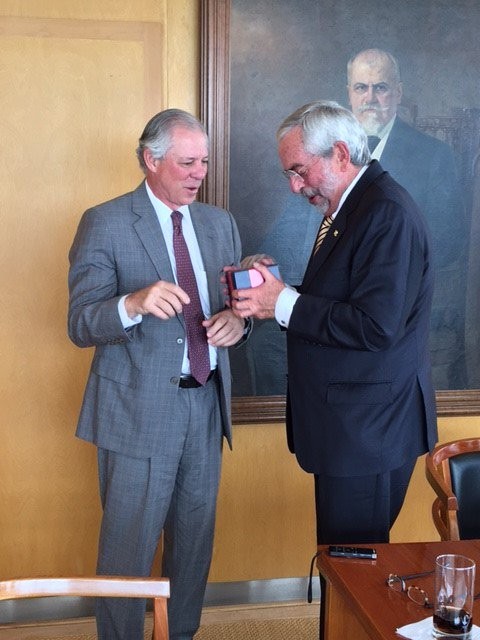During the summer, University of Arizona President Dr. Robert Robbins, alongside a number of UA faculty, traveled to Mexico to meet with a series of academic, industry and government officials in an effort to strengthen UA’s cross-border collaborations.
“The link between the United States and Mexico is vital to both of our peoples,” Robbins said while hosting the new dean of Universidad de Sonora, Dr. Enrique F. Velazquez, in Tucson. “We occupy the same region, and the link is especially apparent here on the campus of the University of Arizona.”
UA currently maintains academic collaborations with 15 Mexican universities, with programs ranging from Women’s Studies and Public Health to Agriculture and Engineering according to the Consortium for North American Higher Education Collaboration, a non-profit located on UA’s campus which tracks and encourages such programs.
The UA also cooperates with a number of non-profits and government institutions, such as Mexico’s National Council on Science and Technology, which funds bilingual research into arid lands between UA’s Mexico City Office and the National University of Mexico.
RELATED: Robbins welcomes UA freshman during dorm move-in
Robbins was accompanied on his trip by Secretary of the University Jon Dudas, Senior Vice President for Research and Director at AZ Research Laboratories Kimberly Espy, Dean of the James E. Rogers College of Law Marc Miller, Dean of Social and Behavioral Sciences John Paul Jones and Dean of the College of Science Joaquin Ruiz.
“We were able to put together a series of really terrific meetings,” Ruiz said. “Robbins did a terrific job.”
The group met with a number of influential Mexican officials including the Secretary of Energy Pedro Joaquín Coldwell, the Undersecretary for North America Carlos Sada Solana, the Secretary of Environment Rafael Pacchiano Alamán, the Secretary of Health José Narro Robles, the Dean of La Universidad Nacional Autónoma de México Dr. Enrique Graue Wiechers and a series of mining and retail industry representatives.

Secretary of Energy
“We talked about solar energy and our technology,” Ruiz said of the meeting with Secretary Joaquin Coldwell. “We are going to look for collaboration on that front.”
The UA has researched algae as a renewable energy source and the material sciences necessary to develop sustainable energy technology.
According to Ruiz, all parties are extremely interested in pursuing funding for new collaborations on renewable energy.
Undersecretary of North America
“I met with UA President Robbins to enhance Mexico-Arizona collaboration between institutions of higher education and research center,” Solana said in a July 24 tweet.
Sada Solana’s office previous helped spearhead U.S.-Mexico Bilateral Forum on Higher Education, Innovation and Research. With delegates from Arizona, the forum produced a report that initiated cross-border funding and collaborative research efforts.
According to Ruiz, immigration was a key discussion point with Solana, and with all the other ministers.
“The law school is developing a variety of programs,” Ruiz said. “One teaches consoles and ambassadors for Mexico about the U.S. legal system. They offer clinics to support undocumented folks that may be here legally but not even know it.”
Secretary of the Environment
“Mexico’s equivalent of the Environmental Protection Agency is very interested in bringing off-grid technologies to villages in Mexico that don’t have any electricity,” Ruiz said. “We are together going to be putting a joint proposal to the Green Fund so we can actually do that.”
The biosphere and its relationship to arid environments, water, food and energy conservation research were also discussed.
Secretary of Health
Narro Robles, once dean of UNAM, developed collaborative programs with then-UA President Robert Shelton.
The UA awarded Narro Robles an honorary degree a few years ago but he was never able to come to Tucson to accept it according to Ruiz.
Robbins awarded him the degree during the trip.
Dean of La Universidad Nacional Autónoma de México (UNAM)
UNAM recently opened a Center for Mexicans Studies on UA’s campus to strengthen the academic and research relationships between the two institutions.
The institutions have many ongoing collaborations, including a program for UA students to spend a full semester studying abroad, and more are in the works.
“The National University of Mexico is developing an international school of the Earth Sciences we will be most likely be apart of,” Ruiz said.
During the meetings, the faculty reflected on past successes in order to inspire new ideas in recent additions to UA and Mexican institutions, like Robbins.
“The UA had an advanced technology transfer program where students from Eller would go down to Mexico and evaluate the value of the technologies coming out of their national labs and build business plans and try to find funding,” Ruiz said as an example.
RELATED: Editorial: Our first impression of President Robert C. Robbins — we’re cautiously hopeful
The current strained political relationship between Mexico and the U.S. actually gives UA and Mexican institutions more fuel to get more things done, Ruiz said.
“The Mexican community is very interested in trying to better the relationships between the two countries,” Ruiz said and that results in very strategic and fruitful academic collaborations.
“The trip was a complete success,” Ruiz said.
After the trip, Robbins hosted the dean of Universidad de Sonora, Enrique F. Velazquez , in Tucson continuing discussions on strengthening our ongoing partnerships for physics and Indigenous Human Rights with Mexico.
“This longstanding partnership fosters collaboration regardless of changes in political climate,” Dale LaFleur, director of institutional relations with the UA Office of Global Initiatives, told UAnews after the event. “We remain dedicated in our commitment to the overall advancement of people in our respective communities and solving the challenges we face,”
Beyond collaboration at the administrative level, even UA clubs can benefit from close ties to Mexico. For example every year, UA’s Model United Nations club hosts a bilingual and binational congress where students from both sides of the border come together to discuss issues from economic development to nuclear proliferation.
Follow Randall Eck on Twitter.









